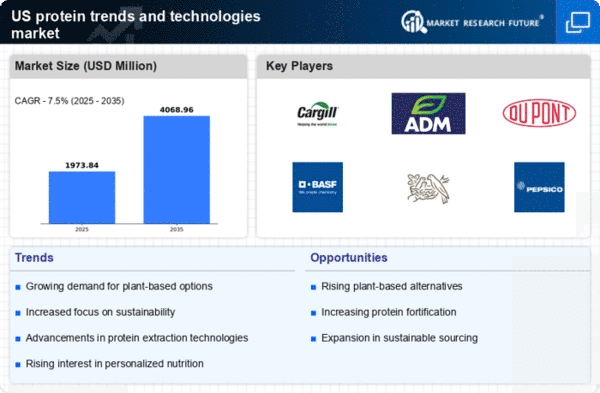Growing Health Consciousness
The increasing awareness of health and wellness among consumers is a pivotal driver in the protein trends-technologies market. As individuals become more health-conscious, they actively seek out protein-rich foods that align with their dietary preferences. This trend is reflected in the rising demand for high-protein snacks and meal replacements, which have seen a growth rate of approximately 20% in recent years. Furthermore, the protein trends-technologies market is adapting to this shift by innovating products that cater to specific dietary needs, such as gluten-free and low-carb options. The emphasis on clean labels and natural ingredients is also influencing product development, as consumers prefer transparency regarding the sources of their protein. This growing health consciousness is likely to continue shaping the market landscape, driving companies to invest in research and development to meet evolving consumer expectations.
Expansion of E-commerce Platforms
The rise of e-commerce platforms is significantly impacting the protein trends-technologies market, providing consumers with greater access to a diverse range of protein products. Online shopping has become increasingly popular, with a reported 30% increase in online grocery sales over the past year. This shift is facilitating the distribution of niche protein products, including plant-based and specialty protein supplements, which may not be readily available in traditional retail outlets. The convenience of online shopping, coupled with targeted marketing strategies, is enabling companies to reach a broader audience. As e-commerce continues to expand, it is likely to play a crucial role in shaping consumer purchasing behaviors and preferences within the protein trends-technologies market, driving growth and innovation.
Rising Demand for Sustainable Practices
Sustainability has emerged as a critical driver in the protein trends-technologies market, as consumers increasingly prioritize environmentally friendly practices. The demand for sustainably sourced proteins is influencing product formulations and supply chain strategies. According to recent studies, approximately 60% of consumers are willing to pay a premium for products that are certified as sustainable. This trend is prompting companies to adopt practices such as regenerative agriculture and responsible sourcing to appeal to eco-conscious consumers. The protein trends-technologies market is responding by developing products that not only meet nutritional needs but also align with sustainability goals. As awareness of climate change and environmental degradation grows, the emphasis on sustainable protein sources is likely to intensify, shaping the future of the market and driving innovation in product development.
Influence of Social Media and Marketing Trends
Social media platforms are playing a transformative role in the protein trends-technologies market, influencing consumer perceptions and purchasing decisions. The rise of health and fitness influencers has led to increased visibility for protein products, particularly those that align with current dietary trends. Marketing strategies that leverage social media are proving effective in reaching target demographics, with studies indicating that 70% of consumers are influenced by social media when making food choices. This trend is prompting companies to invest in digital marketing campaigns that highlight the benefits of their protein offerings. As social media continues to evolve, its impact on consumer behavior in the protein trends-technologies market is expected to grow, shaping product development and marketing strategies.
Technological Innovations in Protein Production
Technological advancements are revolutionizing the protein trends-technologies market, enabling more efficient and sustainable production methods. Innovations such as precision fermentation and cellular agriculture are gaining traction, allowing for the creation of high-quality protein alternatives with reduced environmental impact. For instance, companies utilizing fermentation technology can produce protein at a fraction of the resource cost compared to traditional livestock farming. This shift is not only appealing to environmentally conscious consumers but also aligns with the increasing regulatory focus on sustainability. The protein trends-technologies market is witnessing a surge in investments, with projections indicating that the market for alternative proteins could reach $25 billion by 2030. As these technologies continue to evolve, they are expected to play a crucial role in meeting the growing protein demand while addressing sustainability concerns.

















